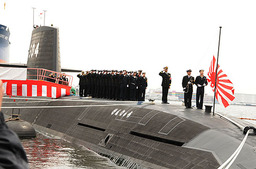 blog.goo.ne.jp
blog.goo.ne.jp According to White, Australia's adoption of Soryu class submarines would leave us at the mercy of Japanese strategic planning, because Japan would reveal as little information about the Soryu to Australia as possible, thus making Australia wholly dependent on Japan for the operation of its submarine fleet.
Does this sound like a plausible scenario? It presupposes that Japan's primary motive in offering submarine technology to Australia is to ensure that Australia (or more accurately, its submarines) cannot operate independently of Japan. Would Japan jeopardise its burgeoning security relationship with Australia by presenting us with a zero-sum option, and would Australia accept such a deal in the first place, given that (in White’s view) it surrenders Australia’s security interests to those of another country?
Australian defence planners cannot be as naive as White portrays them. Despite the political turmoil surrounding the future submarine choice, the existence of a comprehensive evaluation process and its study of alternative models for Australia suggests Defence has been exploring different submarine options for Australia for some time (and it has, at least since the 2009 white paper was released), and that on its advice government agreed to change tack and consider other choices.
The future submarine program could certainly prove beneficial to Japan's heavy shipbuilding industry and mark the entrance of Japan into the world arms trade market, yet Japan knows what the politics of the submarine debate are, and would hardly want to make it even more difficult for Australia to reach a decision by withholding information (the commercial rivals for Japan in Germany and France make a compelling case for revealing information, as any lack of detail would, presumably, impact heavily on the final decision).
Look at things from a Japanese perspective. What does any potential deal with Australia do for Japan? Firstly, it presents training opportunities for the Japanese shipbuilding industry because the insistence of Australia on local involvement would compel the industry to cooperate in improving local Australian skills and efficiencies.
Australia's role in the region, and its fairly benign security stance, would allow Japan to embark upon military equipment sales without the potential for severely upsetting its nearest neighbours. It would open up an entirely new area for Japanese industry, thereby producing jobs in a sector competing with Korea and China for work.
It would allow Japan to extend its potential security partners beyond the US, the first time since 1945 that this will have occurred. It would give Japan the option of working with a regional partner that does not have the same 'baggage' as the US (or history of occupation under Japan).
If Australia was to reject defence cooperation with Japan on the grounds that it would be too destabilising for its relationship with China, what message would that send to other democracies in the region about Australia? It certainly wouldn’t garner confidence, even though it might placate China until the next potential conflagration.
White is convinced that Japan is on a collision course with China and is prepared to take the US and Australia down with it in any future conflict with China. Rather than seeking to diffuse regional tensions, White regards Japan as a catalyst for conflict because Japan would not agree to any Chinese leadership of Asia given this would conflict with Japan’s image of itself as a great power (White, The China Choice, Black Inc, Collingwood, 2012, p.86).
Leaving aside questions of whether Japan does see itself as a ‘great power’ (precedents, as outlined here (J), tends to suggest that it doesn’t, or certainly not in line with any agreed definition of ‘great power’), Japan recognises that the power balance in the region is changing and is not trying to halt that process. At the same time, it does recognise the need for a more pro-active role on its part in ensuring peace and stability in the region and further abroad (MOFA, Diplomatic Blue Book 2015, p.29 - J). This means managing risk through greater cooperation with other states, China included.
The assumption by White, as well as Sam Bateman (found here), is that any future scenario for China-Japan relations is conflict, and that any security relationship with Japan in the form of submarines would place Australia firmly in China’s sights. Therefore take the European option and avoid the risk.
Yet if we are looking at future scenarios, any submarine acquisition by Australia could potentially result in conflict with our neighbours, and any regional conflict could potentially result in Australian involvement. If Japan is offering to share its expertise in submarine building, this immediately benefits Australia’s navy and manufacturing industry while simultaneously strengthening relations between nations in the region.
China may eventually come to surpass Japan economically and technically, yet Australia will have benefitted enormously from its security ties with Japan. We can recognise and mitigate risk without falling prey to our own insecurities.
 RSS Feed
RSS Feed